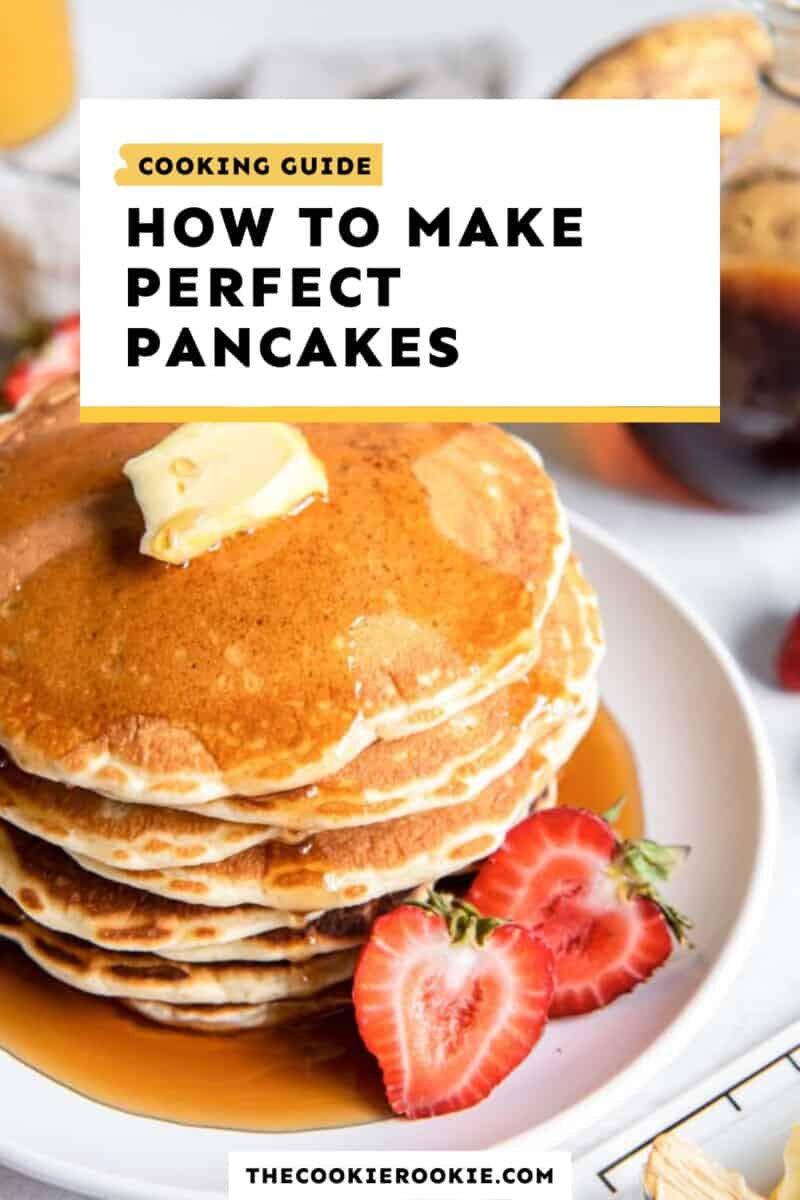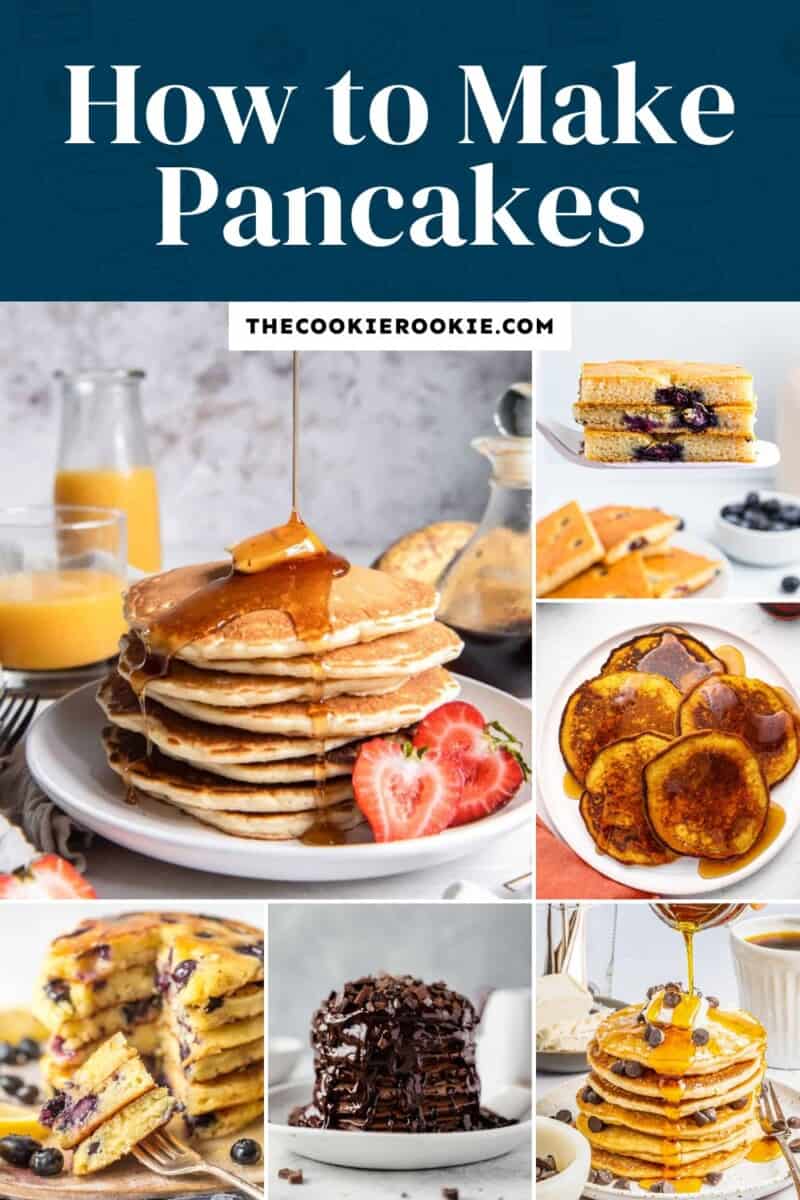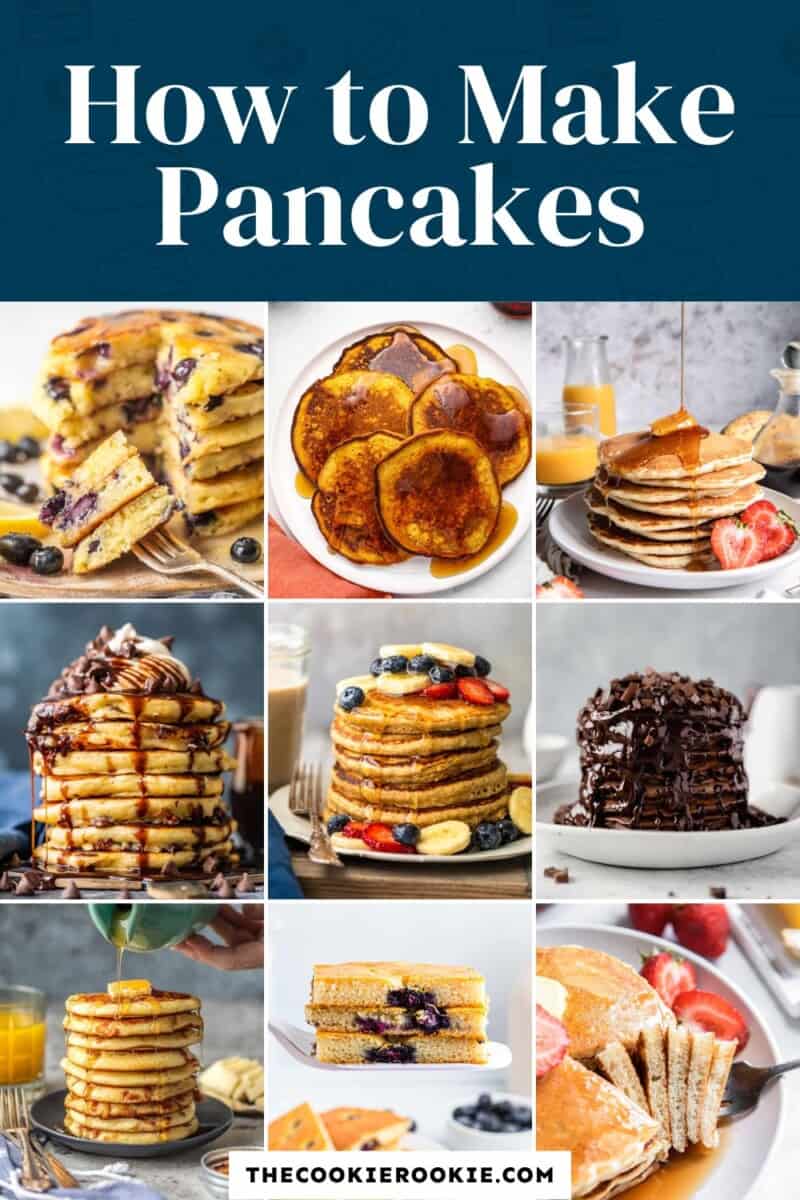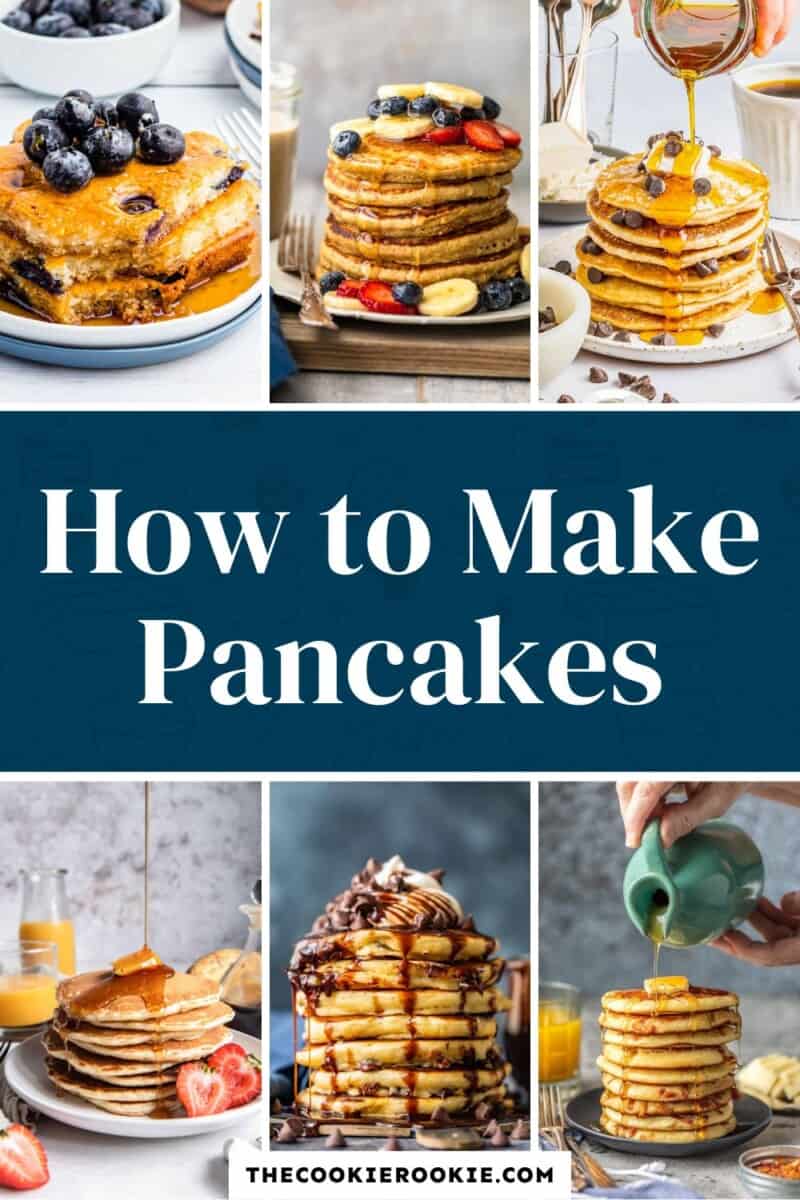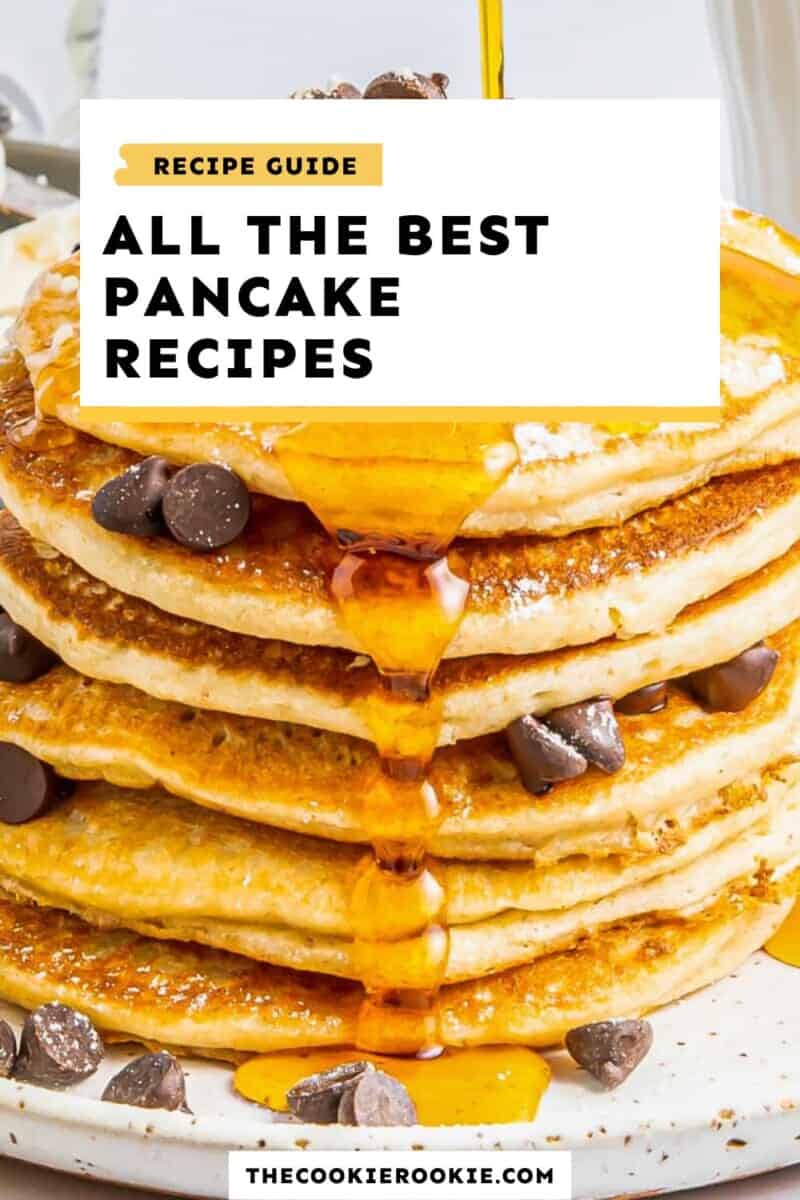Learn how to make pancakes from scratch in the easiest way possible, so you can have deliciously fluffy pancakes everyday. Follow our basic recipe, along with all the tips and tricks to make them perfect. Then try some of our best pancake recipes to switch things up!
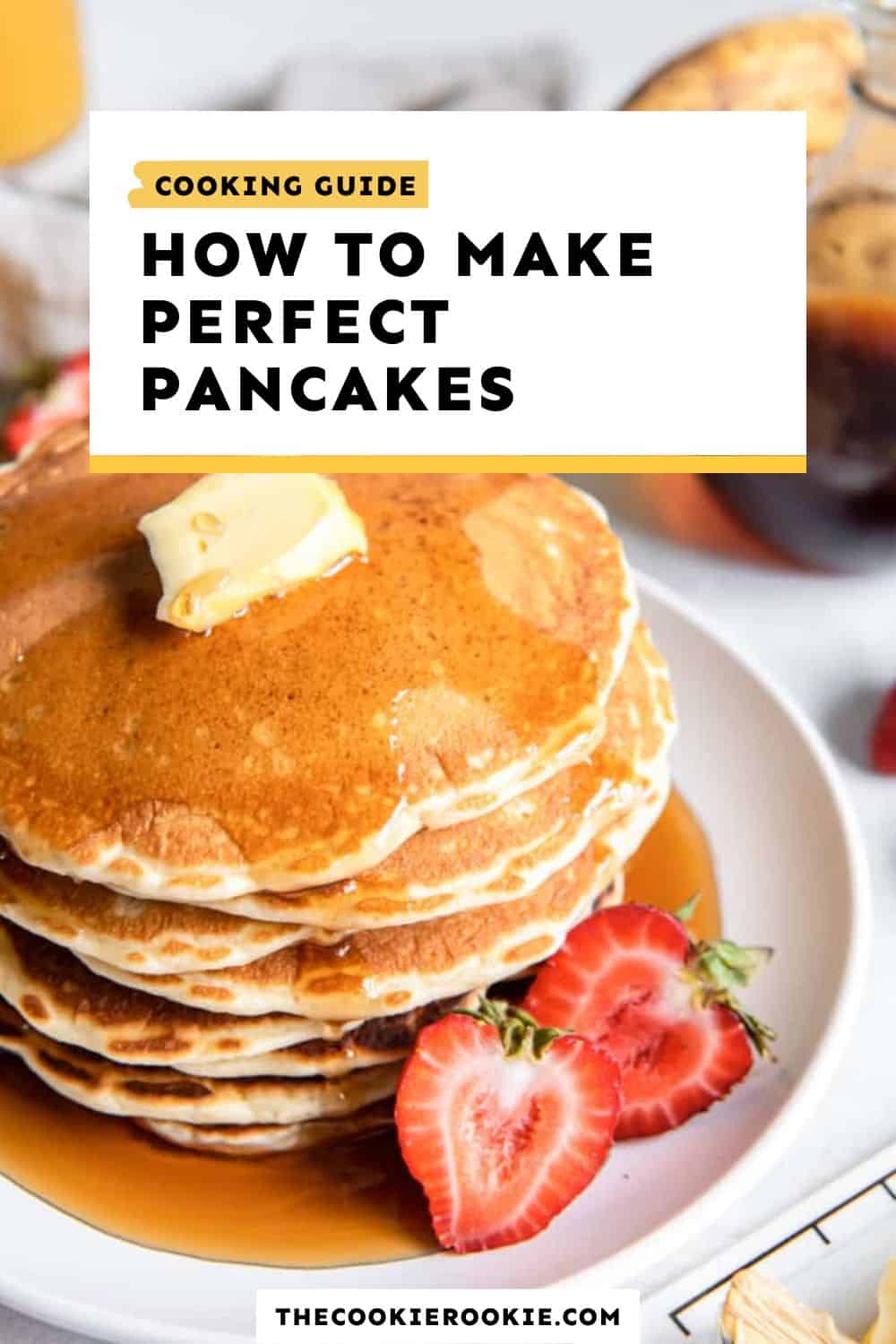
This post may include affiliate links that earn us a small commission from your purchases at no extra cost to you.
The Best Pancakes
No weekend is complete without a plate of fluffy, perfect pancakes soaked in maple syrup! The whole family brightens when they see this breakfast staple on the table.
And with this simple pancake recipe (my go-to), it’s easier than ever to get a stack of hotcakes ready to devour. You only need a few ingredients (mostly pantry staples), a hot skillet or griddle, and a quick flip to make pancakes completely from scratch.
This recipe is so quick and easy, you’ll even be able to make this on weekday mornings! Plus you can find some of our other best pancake recipes down below for a bit of variation (gluten-free, dairy-free, buttermilk, and more–all homemade!).
Basic Pancake Ingredients
- Flour: This is the main ingredient-–the rest add structure, texture, and flavor in different ways. All-purpose flour works best for pancakes.
- Baking Powder: This is the leavening agent, which makes pancakes rise, creating a light and fluffy texture.
- Milk: Milk hydrates the batter and adds flavor. Pancake mixes often call for water, but milk is a much better option.
- Eggs: Eggs add structure by binding ingredients. They also work in tandem with the baking powder to rise, creating a lighter texture, rather than something dense. Yolks also add a richer flavor.
- Fats: Oil and/or butter are typically used when making pancakes. You’ll need something to coat the pan while cooking, and sometimes it’s added into the batter for richness.
- Other Ingredients: Common pancake ingredients like sugar, salt, and vanilla extract are often added in simply for flavor.
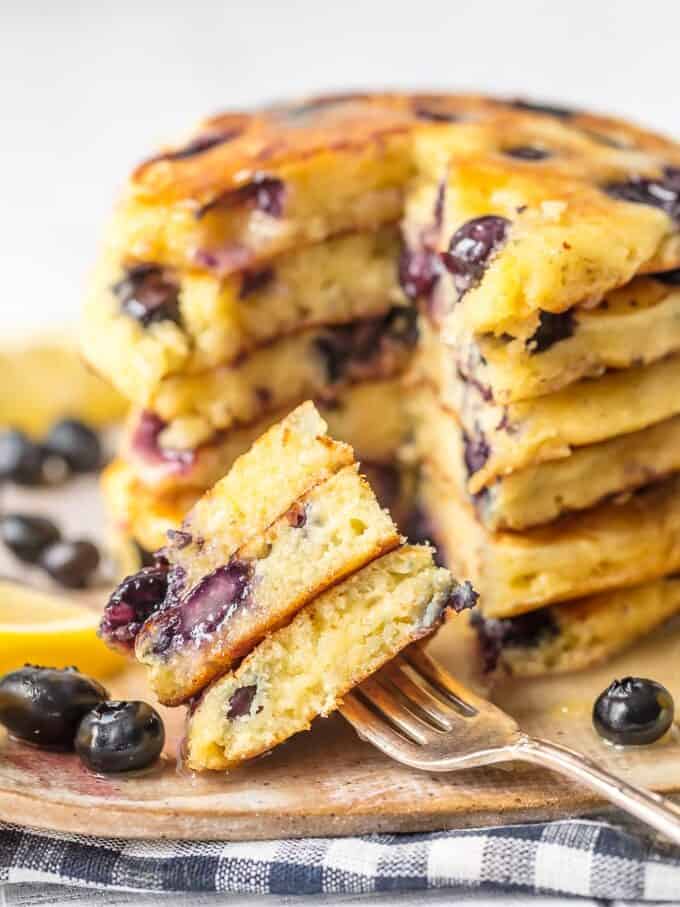
What’s the secret to fluffy pancakes?
There are a few things you can do to make sure you get the best, fluffiest pancakes when you make them at home. Follow these tips!
- Sift your dry ingredients before mixing them with the wet ingredients. Pass it through the sifter a couple of times for best results.
- Make sure your baking powder is fresh. If it’s old, it won’t have the same rising power, and you might end up with thin, flat pancakes.
- Let the batter rest, so the dry ingredients can be fully absorbed.
- Only flip your pancakes one time. The more you flip, the tougher they’re going to get.
- Try beating the egg whites before adding them into the batter–this aeration will once again add some extra fluff into the texture.
How to Make Pancakes from Scratch
Making pancakes from scratch is really just as easy as using a pancake mix. The only difference is that you’ll need to provide the dry ingredients, but you’ll likely have those in your pantry already. You can follow our simple pancake recipe to measure and mix ingredients as listed.
It’s as easy as mixing the batter, flipping the pancakes, and eating!
Easy Pancake Recipe
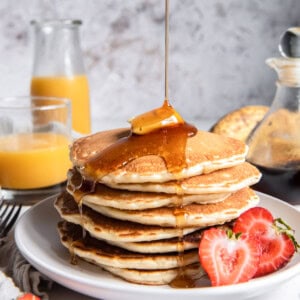
Ingredients
- 2 cups all-purpose flour
- 2 tablespoons granulated sugar
- 2 teaspoons baking powder
- 1/4 teaspoon Kosher salt
- 1 1/2 cups milk whole-fat, 2%, or plant-based milk
- 1 large egg
- 2 tablespoons unsalted butter melted
- 1 teaspoon pure vanilla extract
Instructions
- In a large bowl, whisk together dry ingredients.2 cups all-purpose flour, 2 tablespoons granulated sugar, 2 teaspoons baking powder, 1/4 teaspoon Kosher salt
- In a separate bowl, whisk together all wet ingredients.1 1/2 cups milk, 1 large egg, 2 tablespoons unsalted butter, 1 teaspoon pure vanilla extract
- Pour wet ingredients into the dry ingredients and mix just until incorporated (don't over-mix). If adding mix-ins like chocolate chips or blueberries, gently fold them in here. Let the pancake batter rest for 15 minutes.
- While the batter rests, heat a non-stick pan or griddle over medium heat. Coat with butter or oil if you don't have a non-stick surface.
- Pour 1/4-1/2 cup of batter onto the heated pan. Let it cook for 1-2 minutes, or until bubbles start to form and "pop" on the surface of the batter.
- Use a spatula to flip the pancake, and let it continue cooking until the bottom solidifies and browns. Promptly remove it from the pan and place on a plate.
- Repeat until pancake batter is gone.
Video
Becky’s Tips
- Storing Batter in the Fridge: Pour extra batter into an airtight container, and keep it in the refrigerator 2-4 days.
- Storing Pancakes in the Fridge: Place them in an airtight container or resealable bag, and keep them in the refrigerator for up to 3 days.
- Freezing Pancakes: Place them in a single layer on a parchment-lined baking tray, and freeze for about 1 hour. Then stack them in a freezer-safe bag or container, and freeze up to 3 months. If you skip the first step and stack to freeze, they will get stuck together, making it hard to reheat later.
- Freezing Pancake Batter: Pour batter into a freezer-safe resealable bag, and make sure all air is removed as you seal it. Freeze it flat, and you can rearrange it once it’s fully frozen.
Nutrition information is automatically calculated, so should only be used as an approximation.
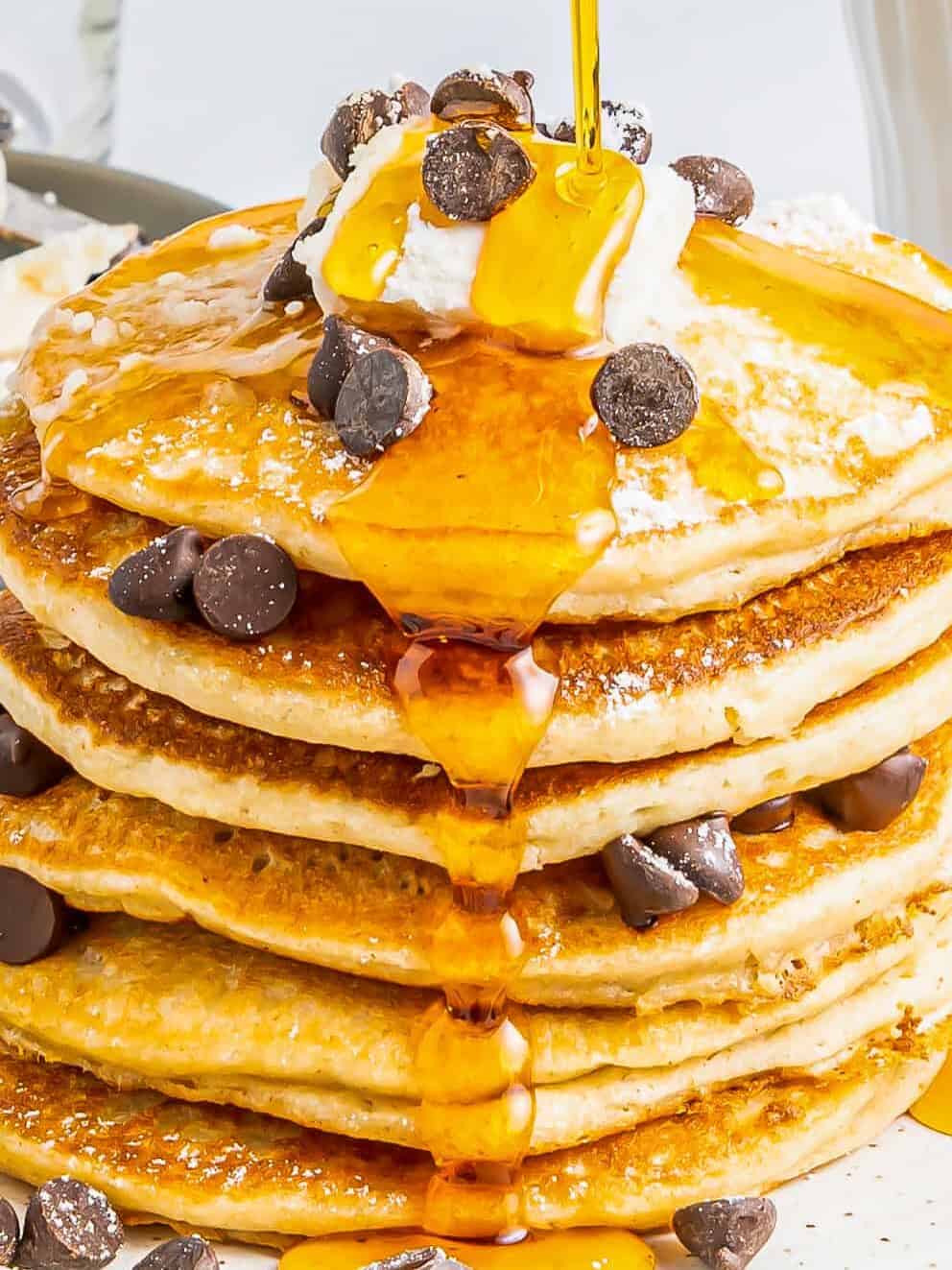
Tips for Making the Best Pancakes
- Don’t overmix the batter, or you will end up with tough and chewy pancakes. Mix the dry and wet ingredients just until most of the dry part is absorbed by the liquid. A few lumps is fine.
- Let the batter rest after mixing, ideally for about 15 minutes. This gives it time to fully absorb the dry ingredients, and ultimately you’ll end up with fluffier pancakes.
- Every batch needs a test pancake. The first one will help you decide if the pan is the right temperature, and whether or not the batter needs quick adjustments.
- Only flip the pancakes once, otherwise they will start to get tough, or the batter will just fall apart and you’ll end up with a mess.
- Either use a non-stick pan, or make sure the pan is generously coated with butter, oil, or a non-stick spray. And add more between each batch. If the batter starts sticking, the pancakes will quickly be ruined.
- As you finish cooking a batch of pancakes, lay them on a plate and cover with a clean dish towel to keep them warm. Or you can place them on a baking tray in the oven (set at 200F).
- Don’t press down on them after flipping. This is a natural habit, but it will flatten the cakes, making them dense.
- Use room temperature ingredients (milk, eggs, butter) for best results.
How do you make pancakes with a pancake mix?
Most boxed pancake mixes contain the dry ingredients, already measured and mixed as needed. This should include flour, a leavening agent (baking powder or soda), and possibly salt and/or sugar. So if you’re starting with a mix, you’ll just need to add the wet ingredients as listed on the box. This will most likely include some combination of eggs, water, milk, and oil.
You can still use a lot of the tips in this post to make your boxed pancake mix even better!
Best Pancake Toppings
Once you’ve perfected this basic pancake recipe, you can easily mix other favorite ingredients into the batter (like blueberries or chocolate chips), or add any delicious toppings you like. So you can change things up a little every weekend, or let everyone choose their favorites.
Here are some simple ideas:
- Maple Syrup
- Chocolate Chips
- Powdered Sugar
- Bacon Crumbles
- Nutella
- Caramel Sauce
- Blueberries
- Whipped Topping
- Sprinkles
- Lemon Curd
- Ricotta Cheese
- Chocolate Syrup
- Lemon Sauce
- Blueberry Compote
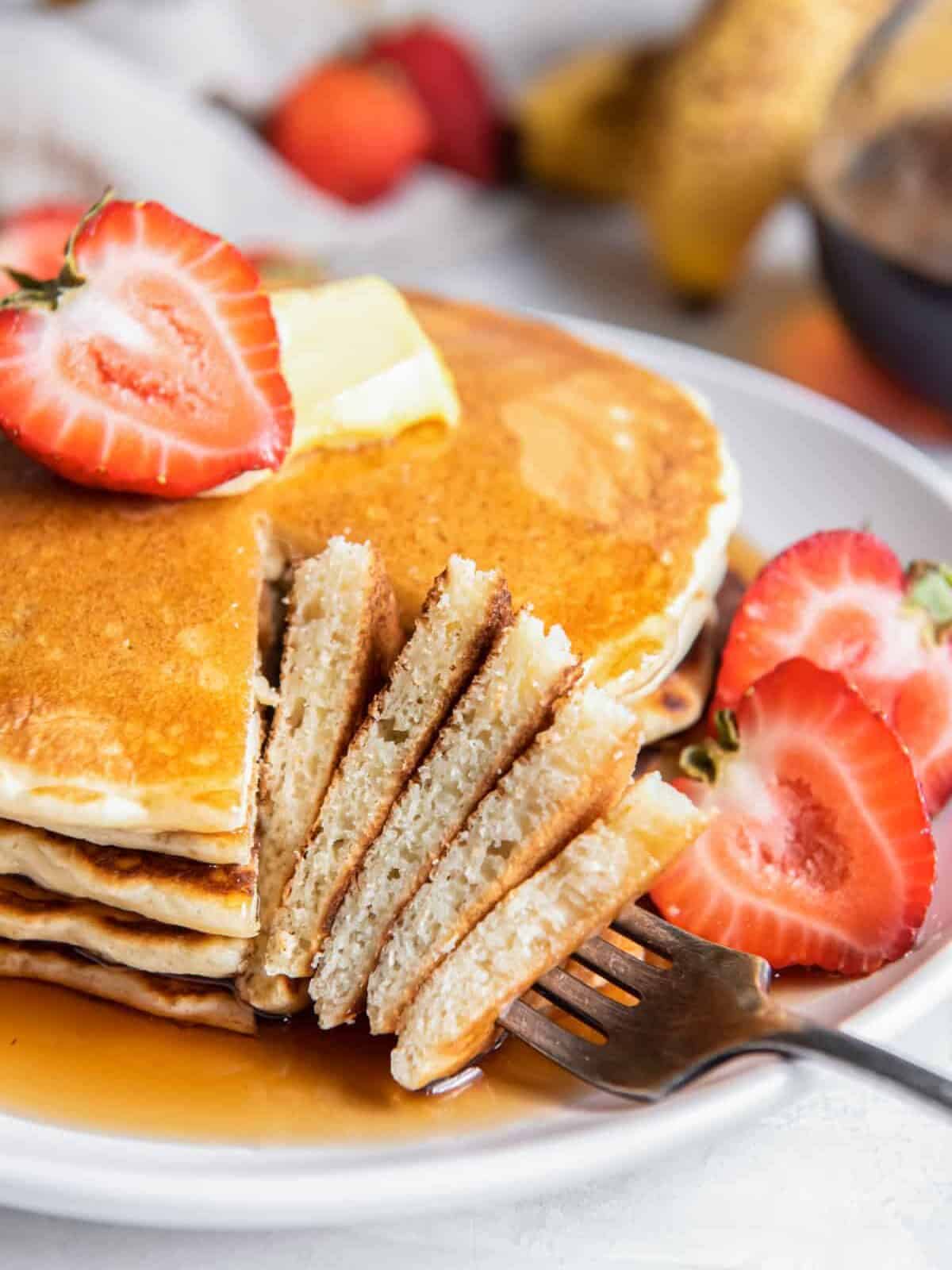
How to Make Pancakes Step by Step
This easy pancake recipe really is simple–it’s basically 3 steps (mix, pour, flip). But I’ve detailed each step with my top tips so you can make the absolute perfect pancakes. Once you get this down, you’ll be making them so fast!
Step 1: Making the Pancake Batter
- Combine dry ingredients in one bowl, and combine wet ingredients in a separate bowl. It’s important to first mix them separately, and then pour the wet ingredients into the dry ingredients to combine.
- Mix the batter just until the dry ingredients are incorporated. You don’t want to overmix the batter, or you will get flat, dense pancakes.
- Let the pancake batter rest after mixing, so it has time to fully hydrate. I recommend resting for 15 minutes.
- The consistency of the batter should be thin enough to pour, but overall on the thicker side. If it’s like water, it’s too thin. To thicken it, sift in more flour. If it’s too thick, you can stir in a small amount of milk or water.
Step 2: Cooking the Pancakes
- While the batter rests, heat a pan or griddle to a medium heat. Use a non-stick surface, or coat generously with butter or oil.
- Pour batter onto the pan. I recommend making pancakes between 1/4 and 1/2 cup (you can use measuring cups to spoon directly onto the skillet). If the surface is large enough, make multiple at once. Just make sure there’s enough space so the batter doesn’t run into each other.
Step 3: Flipping the Pancakes
- You don’t want to flip them more than once, or they will start to get tough. So be patient, and let each side fully cook before flipping.
So how do you know when to flip a pancake?
- Bubbles will start to form on the surface of the batter, and once they start to “pop” and leave behind shallow holes, that’s when you should flip. The bottom should be fully cooked through, and the edges will start to round off, so that the batter sits on top of the cooked side.
- Once flipped, let the other side finish cooking, and promptly remove in from the the pan, onto a serving plate. And repeat until your batter is gone!
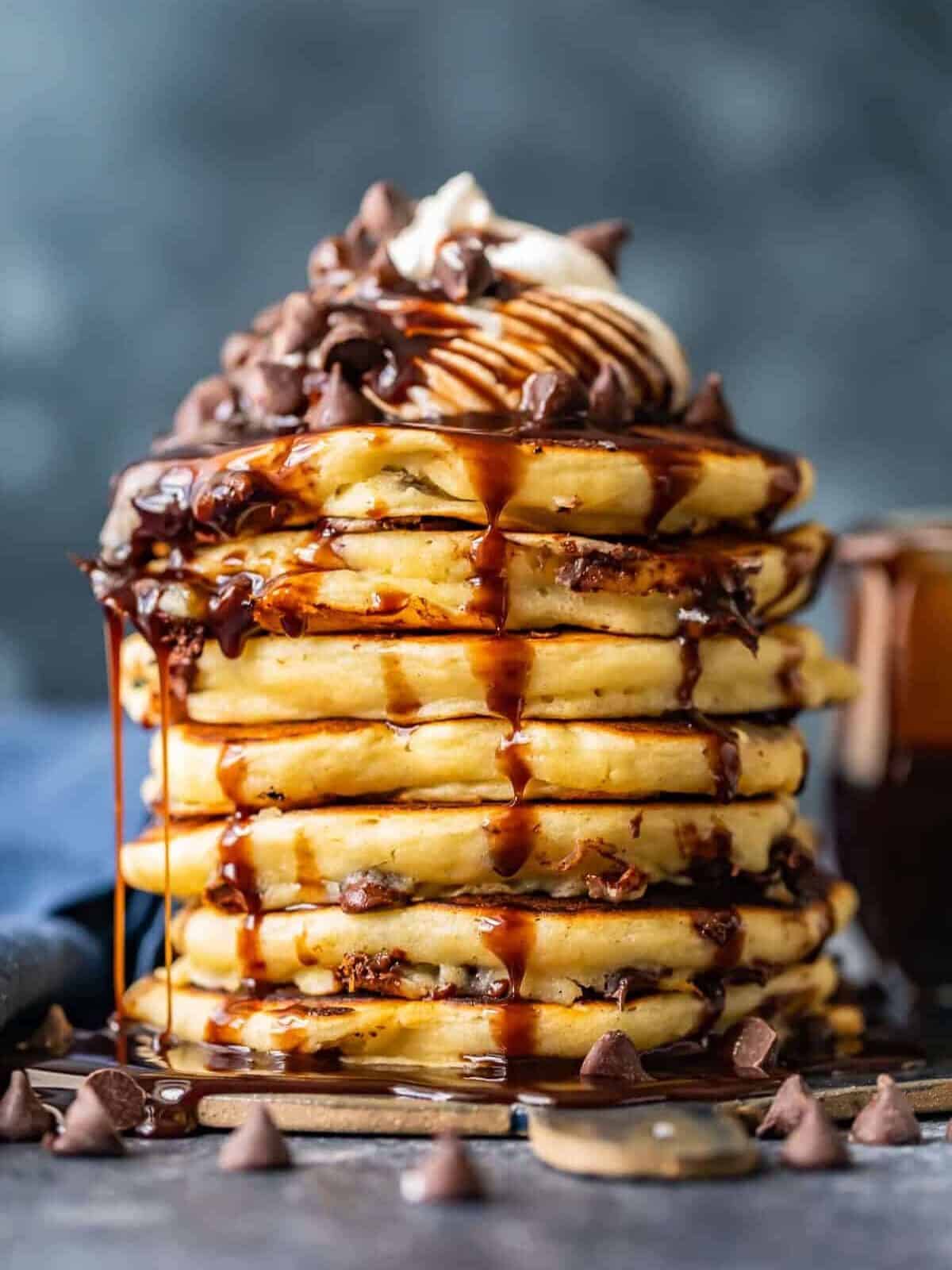
How to Store Pancakes and Batter
- Storing Batter in the Fridge: Pour extra batter into an airtight container, and keep it in the refrigerator 2-4 days.
- Storing Pancakes in the Fridge: Place them in an airtight container or resealable bag, and keep them in the refrigerator for up to 3 days.
- Freezing Pancakes: Place them in a single layer on a parchment-lined baking tray, and freeze for about 1 hour. Then stack them in a freezer-safe bag or container, and freeze up to 3 months. If you skip the first step and stack to freeze, they will get stuck together, making it hard to reheat later.
- Freezing Pancake Batter: Pour batter into a freezer-safe resealable bag, and make sure all air is removed as you seal it. Freeze it flat, and you can rearrange it once it’s fully frozen.
How to Reheat Pancakes
Preheat the oven to 250F. Then arrange pancakes in a single layer on a baking tray, and heat for 5-10 minutes, or until fully warmed through.
You can reheat them directly from frozen in the same way, just add a few more minutes to make sure they’re not frozen in the center.
Best Pancake Recipes
- Buttermilk Pancakes
- Blueberry Pancakes
- Chocolate Chip Pancakes
- Pumpkin Pancakes
- Savory Bacon Pancakes
- Dairy-Free Banana Pancakes
- Chocolate Pancakes
- Blueberry Sheetpan Pancakes
For a gluten-free version, see this gf pancake recipe from Mamaknowsglutenfree.com
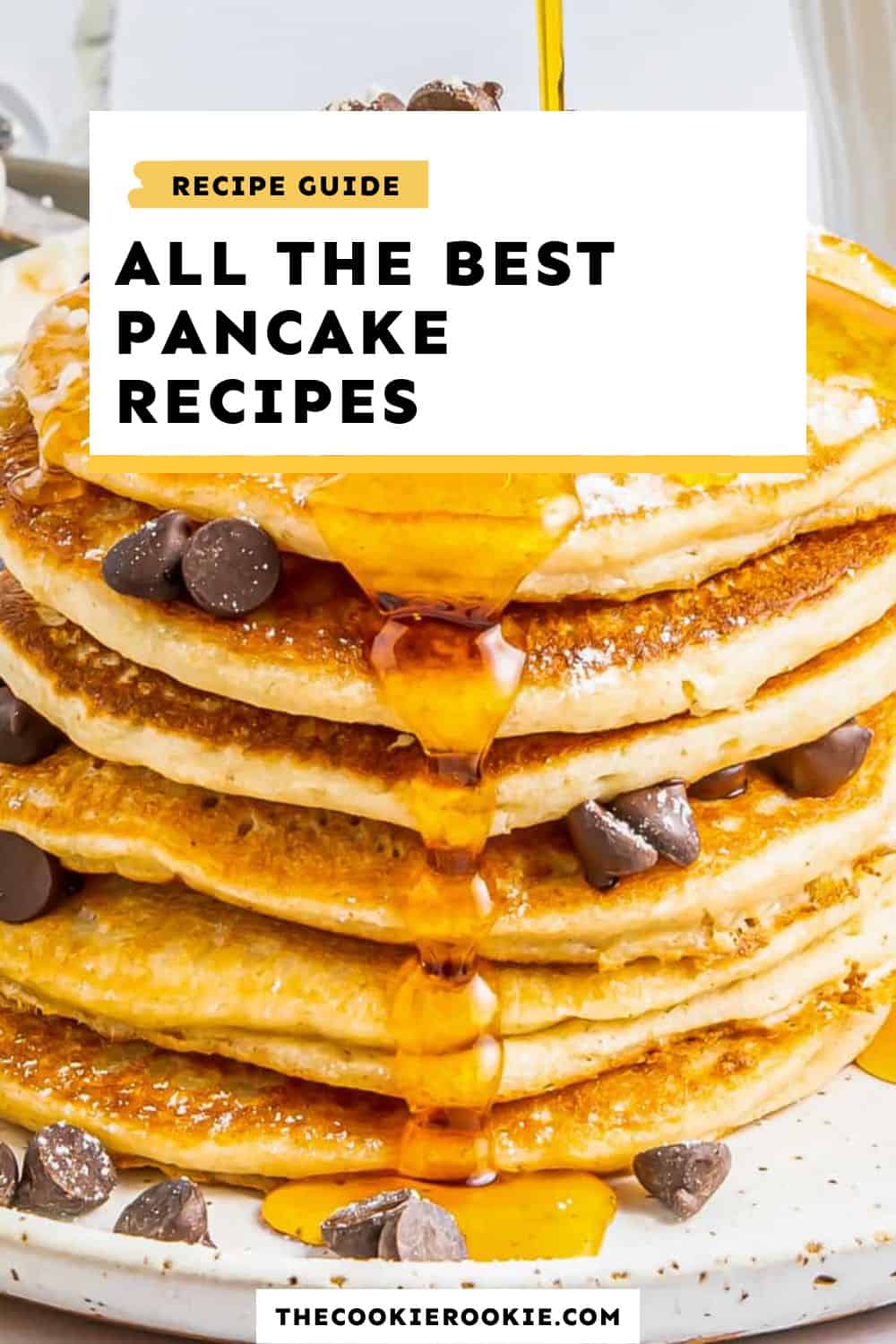
Now that you know how to make pancakes with this super simple recipe, you’ll be able to make the best pancakes any time. Top off that stack with syrup, whipped cream, fruit, chocolate, or anything else your heart desires, and dig in!
Pancakes are flat, thin, usually round cakes made from a batter, then quickly cooked on a hot surface. It’s typically considered a batter bread.
All three terms refer to the same thing in North America, so pancakes are sometimes referred to as either hotcakes or flapjacks, though there is some regional difference.
Healthy wouldn’t be the right term for this breakfast staple–think of it like a piece of cake-y bread, mostly starch. But pairing it with the right toppings and mix-ins, it’s a great weekend treat. Try mixing in protein powder to make them more filling.
A plain pancake is typically fine for dogs to consume, but you don’t want to overdue it. As with most human food, they will be more sensitive to them, and should enjoy a few bites in moderation.
A simple non-stick frying pan is great for cooking pancakes. You can also use cast iron, which does a good job of distributing the heat evenly for precise cooking. Another option is a stove-top or electric griddle. The most important thing is to have a surface that will get hot and won’t stick!
Use medium heat on the stove-top, or heat your griddle to 350F.
If your pancake batter is too thin and runny, you have too many wet ingredients in comparison to dry ingredients. You can slowly sift in more flour until you get the right consistency.
Using lots of butter in the pan will create crispy pancakes, especially around the edges. Thinner pancake batter will also come out crispier.
All-purpose flour is the best option for making pancakes. But you can substitute other options, like a gluten-free flour or whole wheat flour, if you like.
You don’t have to let the batter rest before you start cooking the pancakes, but it is recommended that you give it about 15 minutes of rest time. This will lead to a better texture.
Bubbles will start to form on the surface of the batter, and once they start to “pop” and leave behind shallow holes, that’s when you should flip. The edges should also start to round out, with the bottom fully cooked.
